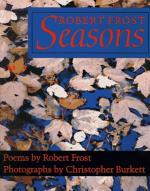|
This section contains 749 words (approx. 3 pages at 300 words per page) |

|
Robert Frost was a man of many voices, the most elusive of which may be the lyric "I" of the New England poet-farmer. Believing that "the colloquial is the root of every good poem," and wanting as a corollary to bespeak American individualism and daring, he strove to be accessible without compromising his integrity as a serious, American poet. To do so he had to remain recalcitrantly local: "You can't be universal without being provincial, can you? It's like trying to embrace the wind," he said in a 1916 interview. Literally, of course, his locality is New England; figuratively, it is poetry's traditional themes—love, sorrow, death, nature, aloneness, art—and its traditional forms. It was a daring gamble to approach so near the mediocre and conventional, using them as a spacecraft uses gravitational fields to sling his poems at the last moment into striking newness that reveals what...
|
This section contains 749 words (approx. 3 pages at 300 words per page) |

|


